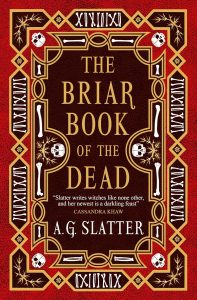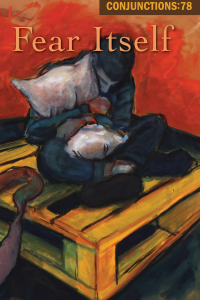Ian Mond Reviews The Briar Book of the Dead by A. G. Slatter
 The Briar Book of the Dead, A.G. Slatter (Titan Books, 978-1-80336-454-4, $16.99, 368pp, tp) February 2024.
The Briar Book of the Dead, A.G. Slatter (Titan Books, 978-1-80336-454-4, $16.99, 368pp, tp) February 2024.
When I reviewed A.G. (Angela) Slatter’s 2022 novel The Path of Thorns, I said she was one of the best contemporary fantasists in the field. But I was wrong; my vision was too narrow. Angela is simply one of the best contemporary writers of fiction, regardless of genre. Deep down, I already knew this, but Slatter’s new novel, The Briar Book of the Dead, solidified those thoughts. Set in Slatter’s Sourdough Universe, this tremendously well-paced and deeply layered novel showcases her attitude to storytelling, not just the craft but also how narratives shape a community, a society.
You don’t need to have read the previous Sourdough stories or the novella Of Sorrow and Such (which acts as an origin story for the Briar witches) to enjoy The Briar Book of the Dead (though, obviously, I strongly recommend that you do). One of Slatter’s many skills as a spinner of tales is to tell you what you need to know about her world without lumbering you with exposition or bogging you down in the admittedly fascinating history of her world. This, again, comes back to the importance of storytelling to the inhabitants of Lodellan and outlying villages like Silverton, where the novel takes place. The tales told to Ellie Briar by her Aunt when she was a child are as much fairytales as they are oral histories. And the same goes for the story Ellie is narrating – a true account of the Briar witches with all the mythic qualities of a fable.
Ellie informs us that unlike her cousins, Nia, Eira, and Audra, and her great aunts, Gisela, the Briar Witch, and Maud, the Steward of Silverton, she doesn’t have a magical bone in her body. No matter how often she pays the ‘‘red price,’’ a ritual involving a sharp blade and her forearm ‘‘littered with cuts, mostly shallow, all red,’’ she can’t perform a spell. Ellie feels the shame of not being a witch, regularly reminded by Nia of her failures. But when Maud abruptly dies, Ellie is elevated into the role of Steward, a position she has trained for alongside her now departed great-aunt. And while Ellie takes on the role with great skill and aplomb, she is still freighted with doubt. Can she be the Steward that Silverton deserves if she can’t perform magic? Will the townspeople respect her? Those concerns are pushed to the background when Gisela (also abruptly) dies and is replaced by Audra as the Briar Witch, and the town is assailed by the revenant of a ‘‘lifeless child left too long out of its grave, unclaimed by a parent’s name.’’ The moment that changes everything for Ellie is when she stumbles at Great-Aunt Gisela’s funeral, striking her forehead and drawing blood. When her visions clear, Ellie sees figures in the crowd:
filling impossibly slim spaces left between parents and children, husbands and wives, siblings and lovers and friends. I recognise some, but… they’re faded somehow, washed out… ghostly.
Yes. Ellie can see ghosts. This is extraordinary, not just because Ellie and magic don’t typically mix but because there haven’t been ghosts in Silverton for three hundred years since they were banished by the first Briar Witch.
If I’ve failed to mention several important plot beats (Ellie’s feelings for Dai Carabhille, the tragic death of Deirdre Baines, the unexpected arrival of a ‘‘god-hound’’ to Silverton), it’s because Slatter, as I’ve now come to expect, loves a well-fed narrative. That’s not to say I take Slatter’s writerly chops for granted, far from it. I remain gobsmacked at her skill at weaving together multiple threads while also fleshing out her characters and themes. Because plot-driven fiction is so linked to genre and the mainstream, this sort of elite skill doesn’t always get the recognition it deserves. Well, I’m here to recognise it.
On the subject of theme, like her previous two novels – All the Murmuring Bones and The Path of Thorns – The Briar Book of the Dead is about what it means to be an independent woman in a theocratic, male-dominated society. As a matriarchy, Silverton would seem to be a haven for freethinking women. But as Ellie knows, the Briar family is only tolerated by the Archbishop of Lodellan because they’ve acted as a protection to the Leech Lords for three centuries. Even their stewardship of Silverton relies heavily on the residents fearing and respecting the magic wielded by the Briars. This especially resonates for Ellie because she can’t perform magic; she has to rely on her wits and her judgement (only further complicated when she becomes an advocate for ghosts). The way she confronts the revenant of Deidre’s stillborn baby is symbolic of her courage and her desire to help others. It’s a nuanced and balanced portrait of strength and fearlessness, adding Ellie to a list of Slatter’s heroines, along with Miren O’Malley and Asher Todd. The Briar Book of the Dead is everything I love about Slatter’s fiction: the craft, the passion for narrative, and the foregrounding of strong, smart, singular women. More, please.
IF YOU ENJOYED THIS REVIEW, please take a moment to support what we do! Our annual fund drive ends April 5. We must meet our funding goals to continue!
Ian Mond loves to talk about books. For eight years he co-hosted a book podcast, The Writer and the Critic, with Kirstyn McDermott. Recently he has revived his blog, The Hysterical Hamster, and is again posting mostly vulgar reviews on an eclectic range of literary and genre novels. You can also follow Ian on Twitter (@Mondyboy) or contact him at mondyboy74@gmail.com.
This review and more like it in the February 2024 issue of Locus.
 While you are here, please take a moment to support Locus with a one-time or recurring donation. We rely on reader donations to keep the magazine and site going, and would like to keep the site paywall free, but WE NEED YOUR FINANCIAL SUPPORT to continue quality coverage of the science fiction and fantasy field.
While you are here, please take a moment to support Locus with a one-time or recurring donation. We rely on reader donations to keep the magazine and site going, and would like to keep the site paywall free, but WE NEED YOUR FINANCIAL SUPPORT to continue quality coverage of the science fiction and fantasy field.
©Locus Magazine. Copyrighted material may not be republished without permission of LSFF.








